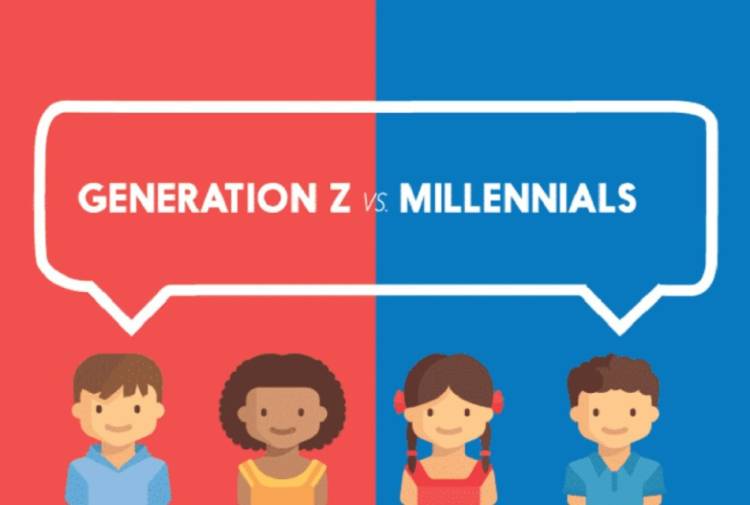Generational Clash: Unveiling the Evolution from Millennials to Gen Z - Embracing Change in a Digital Era

Generational Clash: Unveiling the Evolution from Millennials to Gen Z - Embracing Change in a Digital Era
The generational landscape is continually evolving, shaped by technological advancements, cultural shifts, and socio-economic dynamics. Two prominent cohorts, Millennials and Generation Z, offer intriguing insights into how each group navigates the world and shapes its future. Here, we delve into the key similarities and differences between these two generations.
Technology: The Digital Divide
- Millennials (Born 1981-1996): Often referred to as digital pioneers, Millennials witnessed the rise of the internet and the advent of social media during their formative years. They adapted to technology's rapid evolution, embracing smartphones, social networking sites like Facebook, and early online platforms for communication and entertainment.
- Generation Z (Born mid-1990s to early 2010s): In contrast, Generation Z is characterized by being true digital natives. They grew up in a world where smartphones, social media, and streaming services were already integral parts of daily life. From Snapchat to TikTok, they effortlessly navigate multiple digital platforms, leveraging them for social interaction, learning, and self-expression.
Values and Attitudes: Shaping the Future
- Millennials: Known for their idealism and desire for purpose-driven careers, Millennials prioritize work-life balance, diversity, and sustainability. They are vocal advocates for social justice causes, embracing a more inclusive worldview and challenging traditional hierarchies in the workplace.
- Generation Z: Similarly, Generation Z places a strong emphasis on social justice, diversity, and sustainability. However, they are characterized by a heightened pragmatism and entrepreneurial spirit. Unlike Millennials, who often seek stability in established careers, Generation Z is more inclined towards creating their opportunities, whether through freelance work, digital entrepreneurship, or innovative startups.
Education and Learning: Shifting Paradigms
- Millennials: Education for Millennials often emphasized traditional pathways, such as attending college and pursuing degrees in fields like business, technology, and liberal arts. They value higher education as a means to secure stable careers and financial independence.
- Generation Z: In contrast, Generation Z exhibits a preference for practical skills and experiential learning. They are more likely to explore alternative education paths, such as online courses, vocational training, or apprenticeships, driven by a desire for immediate applicability and flexibility in learning.
Communication and Socialization: Redefining Connections
- Millennials: Millennials pioneered the shift towards digital communication, utilizing platforms like email, instant messaging, and social media to maintain connections and foster communities. They value authenticity and personalization in their interactions, shaping the early landscape of online engagement.
- Generation Z: For Generation Z, communication extends beyond mere connectivity; it is about cultivating authentic, meaningful relationships. They gravitate towards visual and ephemeral content on platforms like Instagram Stories and TikTok, favoring authenticity and relatability in digital interactions. Their social circles are often global, and interconnected through shared interests and online communities.
Outlook on the Future: Navigating Uncertainty
Both Millennials and Generation Z face unique challenges and opportunities as they navigate adulthood and shape the future. Millennials were deeply impacted by the 2008 financial crisis, shaping their cautious approach to financial planning and career stability. In contrast, Generation Z faces uncertainties exacerbated by global crises like climate change, economic volatility, and the ongoing digital transformation.
A Continuum of Change
As Millennials pass the baton to Generation Z, the generational continuum reflects a dynamic interplay of continuity and change. While both cohorts share values of inclusivity, social justice, and digital fluency, their approaches to education, career paths, and technological integration differ significantly. Understanding these generational nuances is essential for businesses, educators, and policymakers seeking to harness the unique strengths and perspectives of each group in building a more resilient and inclusive future society.
If you enjoyed this post, I’d be very grateful if you’d help it spread by emailing it to a friend or sharing it on Twitter or Facebook. Do not forget to like on Facebook and follow us on Instagram. Send your entries too…
Thank you! Signing off
-Team Social Mela


 Shruti Singh
Shruti Singh 
























Comments (0)